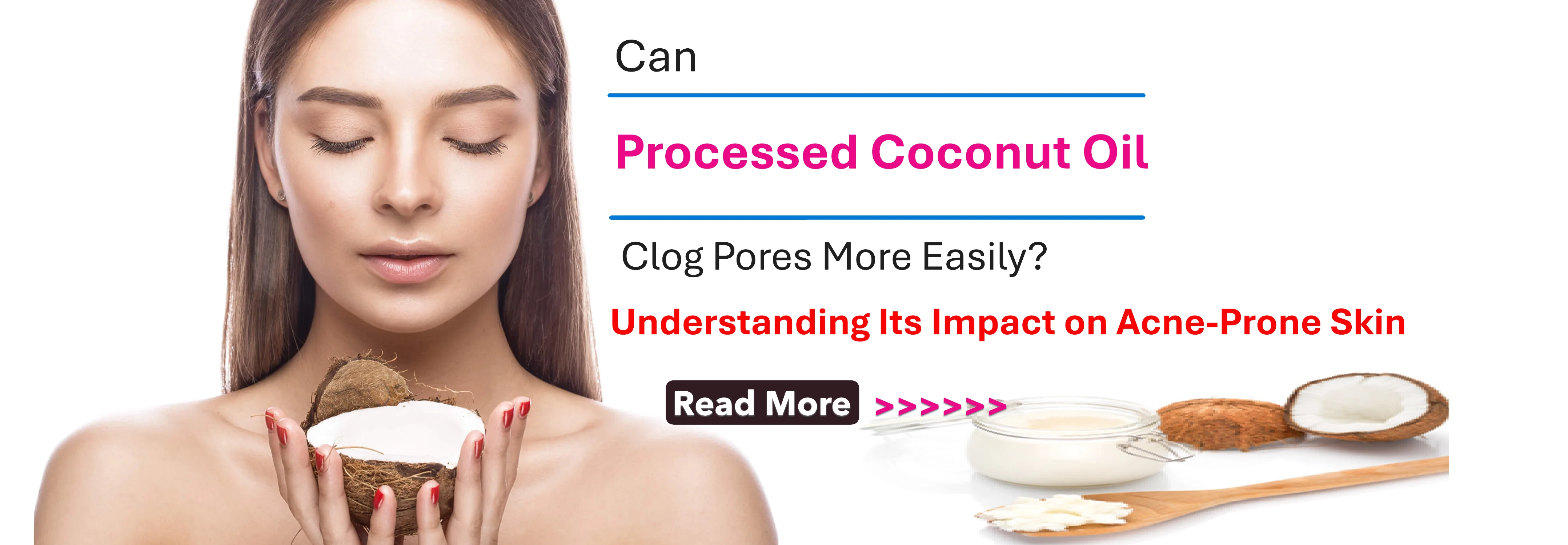Can Processed Coconut Oil Clog Pores More Easily? Understanding Its Impact on Acne-Prone Skin
Can Processed Coconut Oil Clog Pores More Easily? Understanding Its Impact on Acne-Prone Skin
Coconut oil is a beloved natural ingredient in skincare, valued for its deep moisturizing and antibacterial properties. However, not all coconut oil is created equal—especially when it comes to acne-prone skin. One major concern is whether processed coconut oil (also known as refined coconut oil) is more likely to clog pores and cause breakouts compared to its unrefined counterpart. Let’s explore how processed coconut oil affects the skin and whether it’s suitable for those with acne-prone or sensitive complexions.
What Is Processed (Refined) Coconut Oil?
Processed or refined coconut oil is made from dried coconut meat, known as copra, and undergoes refining, bleaching, and deodorizing to remove impurities, color, and scent. This makes it more neutral-smelling and shelf-stable but also results in a product that is less nutrient-rich than virgin or cold-pressed coconut oil.
Refined coconut oil typically lacks some of the beneficial compounds like antioxidants, polyphenols, and lauric acid—the fatty acid known for its antibacterial effects on acne-causing bacteria.
Is Processed Coconut Oil Comedogenic?
Coconut oil, whether refined or unrefined, is generally comedogenic, meaning it has a tendency to clog pores, especially when used on the face. It ranks between 4 and 5 on the comedogenic scale (with 5 being the most likely to clog pores), making it a risky choice for those with oily, acne-prone, or combination skin.
Processed coconut oil may:
-
Sit heavily on the skin, especially in cream-based products
-
Trap dirt, bacteria, and sebum inside the pores
-
Lack the antibacterial protection found in virgin coconut oil due to the removal of lauric acid and other compounds during processing
While it is often more refined and lighter in texture, this does not necessarily make it safer for breakout-prone skin.
Why It Might Still Be Used in Skincare
Despite its comedogenic rating, processed coconut oil is still used in some skincare products because:
-
It acts as an effective emollient, sealing moisture into dry or compromised skin.
-
It’s less irritating for some people compared to essential oils or fragrances.
-
It is more stable and odorless, making it preferable in formulations for people with scent sensitivities.
However, for those with acne-prone skin, the risk of clogged pores generally outweighs these benefits.
Better Alternatives for Acne-Prone Skin
If you’re looking for non-comedogenic oils with similar moisturizing benefits, consider these alternatives:
-
Jojoba oil (comedogenic rating: 2) – Closely mimics the skin’s natural sebum
-
Argan oil (comedogenic rating: 0) – Lightweight and rich in antioxidants
-
Hemp seed oil (comedogenic rating: 0) – Balancing and anti-inflammatory
-
Rosehip oil (comedogenic rating: 1) – Rich in vitamin A and supports skin regeneration
Conclusion
Processed coconut oil can clog pores more easily, particularly for those with oily or acne-prone skin. While it’s still useful for moisturizing the body or dry patches, it’s best avoided on the face if you’re susceptible to breakouts. Opting for lighter, non-comedogenic oils can help you achieve healthy, hydrated skin without the risk of clogged pores.

Related Blog
What Causes Oily Skin and Can It Be Managed Naturally? Exploring Root Causes and Gentle Solutions
Aug 2, 2025 by Admin
General
What Are the Signs That You Have Sensitive Skin? Key Symptoms to Help You Identify This Delicate Skin Type
Aug 1, 2025 by Admin
General